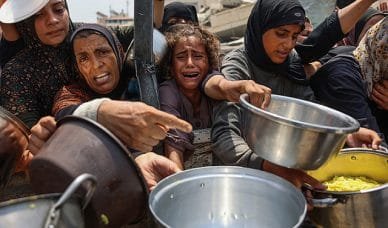
Israel’s highest court ruled that food provided to Palestinian prisoners failed to meet legal standards.
Introduction The gist of a complex dispute Israeli Court Palestinian prisoners
This is a ruling by Israel’s highest court in the Middle East’s complex and highly controversial political landscape. But it has reignited debate over the thin line between human rights, national security and the rule of law. The ruling concerns the quantity and quality of food provided to Palestinian security prisoners. The gist of the matter is that Israel’s highest court held that the food provided to Palestinian security prisoners by the country’s prison service does not meet the minimum calorie and nutritional standards set by the Israeli government in its laws, but in some cases, it does not meet the minimum calorie and nutritional standards set by the Israeli government in its own laws. The ruling is the result of a years-long legal battle and petitions filed by several human rights organisations.
Food Issue Petition of the Lunch Box
This dispute is not new. For years, Palestinian prisoners and human rights organisations have been claiming that the IPS does not provide prisoners with adequate or quality food. But they alleged that the food provided is often bad. It is also nutrient-poor and does not meet the dietary requirements of an adult. This led to the prisoners’ families bringing in extra food through visitors to the prisons. This became an unofficial practice to supplement the prisoners’ diet. But over time, the IPS began to ban or restrict this practice, which further worsened the prisoners’ food conditions.
Israeli government’s stance
The Israeli government and the IPS have long denied these allegations and their arguments have mainly centered on these points. Also security concerns which they claimed were that food boxes brought by families often contained contraband (such as knives, mobile phones, drugs, messages etc.) which posed a serious threat to prison security. Adequacy which IPS said the food it provided met the minimum nutritional standards set by the Ministry of Health. And the punishment aspect which was also a strong political and public opinion that people convicted of terrorism should not have privileges and that prison life should be as harsh as a punishment.
This also led to a long legal battle called the Petition of the Lunch Box. Also human rights organizations such as the Association for Civil Rights in Israel and others filed a petition in the Supreme Court against IPS, claiming that the lack of food was a violation of a basic human right.
Supreme Court Judgment Details
The Supreme Court gave a clear and important verdict after a long hearing of the case. Also the bench of judges mainly held that and violation of the law which was that IPS was not following its own rules. The court held that It was found that in reality, the food provided to the prisoners was not even meeting the minimum calorie intake (about 1800-2100 calories per day) that IPS had set in its regulations and was a violation of human rights. The court made it clear that getting adequate and nutritious food is a basic human right.
Even if the person is a prisoner. And this right is linked to the right to protection from “inhuman or degrading treatment”. So that which is guaranteed by the Basic Law of Israel and international law such as the UN Standard Minimum Rules for the Treatment of Prisoners or the Nelson Mandela Rules.
What instructions did the court give to the government
Instead of just pointing out the problem, the court issued some concrete instructions to the government and IPS as well as immediate improvement in the quantity and quality of food. The court ordered IPS to ensure that every prisoner gets adequate nutritious food that meets the prescribed calorie and nutrition standards. Along with this, alternative arrangements were made. The court said that if the government wants to ban the food (lunch box) brought from outside. But it is its responsibility to It should make an alternative arrangement to compensate for it. This could mean increasing the quantity and quality of food in prisons so much that there is no need for outside food. Also, transparency and monitoring The court also suggested that IPS should bring more transparency in its food distribution process and also provide independent monitoring. So that it can be ensured that the rules are being followed properly.
Political and social reaction on Israeli Court Palestinian prisoners
Right-wing criticism: Israel’s right-wing and radical government and its supporters strongly criticized this decision. And they argue that the court is in favor of terrorists and is ignoring the interests of national security. But for them, giving any kind of comfort to the prisoners is like treason. Also, the victory of human rights groups: On the other hand, human rights organizations and left-wing/liberal groups have welcomed this decision. And for them, this is a big victory of justice, morality and rule of law. They believe that the identity of a civilized society is how it treats even its worst enemies. But Palestinian reaction: On the Palestinian side, this decision is seen as a moral victory. Palestinian prisoners have a status in their society. And their decision to be executed by Israel’s own court is denied. The recognition of Palestinian rights is a significant moment.
International response Israeli Court Palestinian prisoners
The international community, particularly the EU and UN human rights bodies, have long been monitoring the situation of Palestinian prisoners in Israeli jails. The decision will be a positive development for them and shows that there are institutions within Israel itself that are trying to uphold human rights standards. To understand the role of prisoners in the Israel-Palestine conflict, it is important to know that Palestinian prisoners are not just criminals in the Israel-Palestine conflict but a deeply symbolic and political entity.
Conclusion: Justice Ethics and State Responsibility of Israeli Court Palestinian prisoners
This decision by Israel’s Supreme Court addresses a complex moral dilemma. But it is about what obligation a democratic state has to its most bitter enemies. What the court has essentially said is that the state’s morality and legal commitment should not be determined by the behavior of its enemies. And being a civilized society means that you uphold certain basic standards of human rights no matter how difficult the circumstances. But this decision does not dismiss security concerns. Rather, it expects the government to find a better balance between security and human rights. Also, find more effective methods to deal with security risks than by starving prisoners.







1 thought on “Israeli Court Palestinian prisoners food rights ruling”